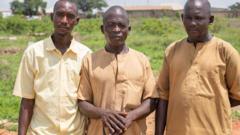For over five decades, the Abdullahi family has become a vital part of Kaduna's community, tending to the expansive Tudun Wada Cemetery, which has long been a resting place for the city's Muslim residents. Initially motivated by familial teachings about Divine reward for service rather than monetary gain, the family has carried out their duties with dedication and pride.
The cemetery, established a century ago, offers a solemn service that few are willing to undertake. Ibrahim and Adamu Abdullahi, two brothers who began the family’s involvement in the 1970s, have passed on the responsibility to their children. Now, under the guidance of Magaji Abdullahi, along with his cousins Abdullahi and Aliyu, the trio manages the daily operations of the graveyard, rising at dawn to prepare for a long day of emotional labor.
When a death occurs, the family receives urgent calls from grieving relatives or local imams, leading them to swiftly get to work. Following Islamic rites, they prepare bodies with care and respect, then dig graves, often under the harsh Nigerian sun. Although the work can be physically demanding, especially during peak periods of loss in the community, the family remains focused on their altruistic mission.
In times of communal turmoil, particularly during instances of religious conflict, their work has taken on even greater significance. They have actively participated in the recovery of bodies during tragic events, a role that has solidified their commitment to their community and strengthened their resolve in the face of adversity.
Generations of the Abdullahi family have cultivated a deep understanding of the cemetery's layout, learning to guide mourners to the resting places of their loved ones—an invaluable service rendered by people who have taken on the mantle of caretakers.
Historically reliant on donations from mourners for their subsistence, recent developments have led to a notable change: the family has begun receiving monthly salaries from the local government, a step toward formal recognition of their labor. Though the pay remains below the national minimum wage, local officials have promised to improve working conditions, including better equipment and enhanced security for the graveyard.
The new developments have brought hope to Magaji, who envisions a future where one of his 23 children continues the family legacy at the cemetery, ensuring that the Abdullahi family's contribution to their community will endure for generations to come.






















